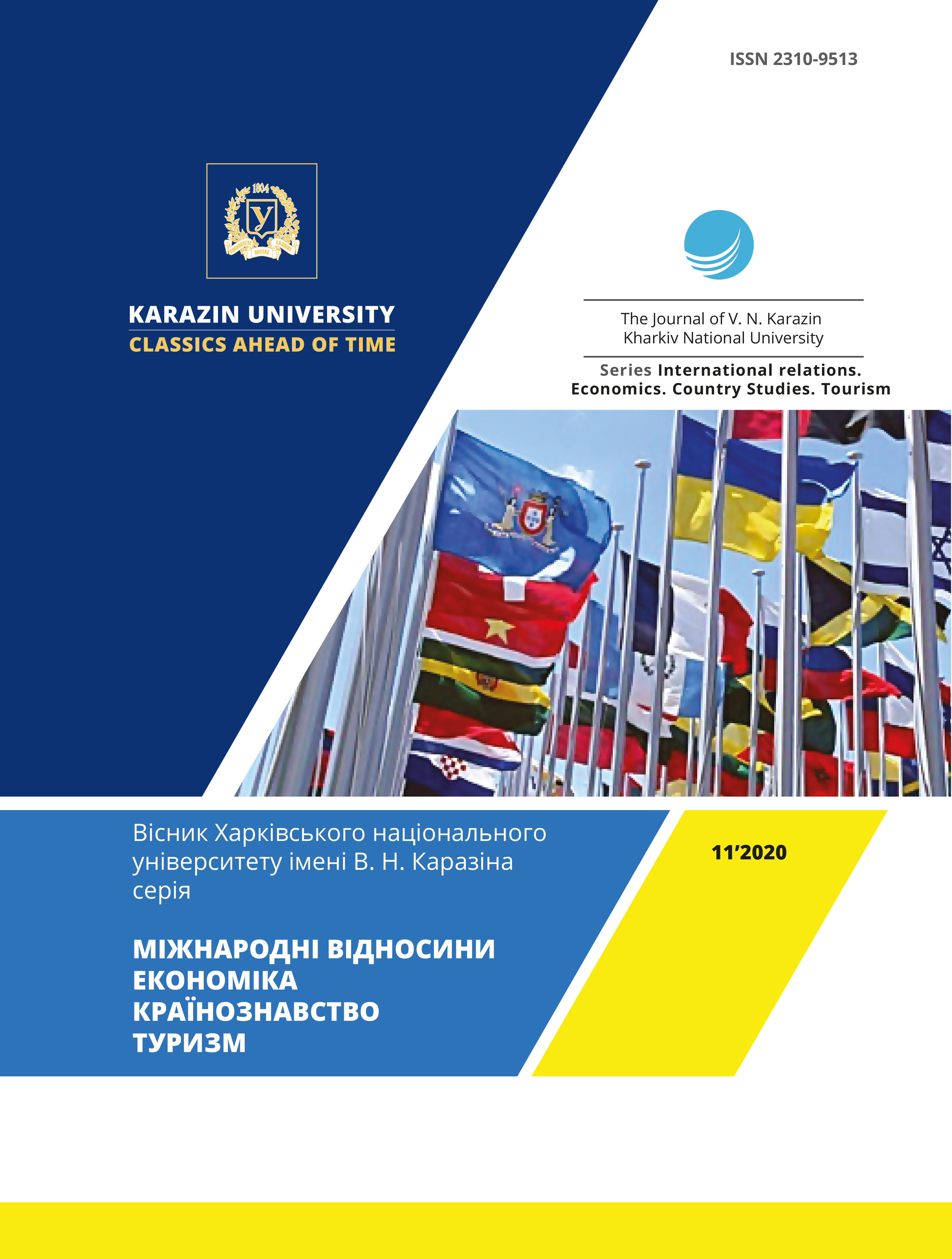Development of integration processes in the globalization conditions: Ukraine and EU-countries
Abstract
The change in Ukraine’s position, taking into account various approaches to assessing the development of integration processes, indicates the importance of choosing the forecast for the development of integration with EU member states. The subject of the study is integration with the EU member states. The aim of the article is to analyze the development of integration processes in Ukraine and the EU member states, build a forecast of the strategy of international integration on the example of Ukraine and the EU countries in the context of globalization. Research methods: the method of multivariate statistical analysis, namely factor analysis to determine the factors affecting the development of integration processes; modeling of growth curves for predicting the values of indicators of integration processes. The calculations were performed using the Statgraphics Centurion application package. Based on the results of the research, a basis of indicators characterizing the socio-economic situation of the member countries of the integration processes is formed. It included: GDP and GDP per capita, attracting foreign direct investment and consumer price indices; as well as the share of ICT goods. The analysis of problems and prospects for the development of integration processes on the basis of a theoretical and logical analysis taking into account the strategic directions of development of the Ukrainian economy and the world economy is carried out. The forecast indicators for the member countries of the EU group and Ukraine are calculated. This allowed us to develop forecast scenarios for the development of integration processes of the member countries of integration processes in the long term. Based on the forecast obtained, strategic positions of Ukraine and the EU member states in the global integration space for three forecasting periods are formed. Conclusions: priority scenarios for the development of the integration processes of these EU member states are identified, namely Czech Republic, Estonia, Latvia, Lithuania, Poland and Ukraine indicate a positive prospect of EU cooperation with Ukraine in the aspect of international integration.
Downloads
References
Dubrov, A.M. & Mhitarjan, V.S. & Troshin, L.I. (2000). Mnogomernye statisticheskie metody [Multivariate statistical methods]. Moskow: Finansy i statistika (in Russian).
Maljarets, L. M. (2006). Vimіrjuvannja oznak obyektіv v ekonomіcі: metodologіja ta praktika: naukove vidannja [Measurement of features of objects in the economy: methodology and practice : scientific publication]. Harkіv : HNEU (in Ukraine).
Ponomarenko, V.S. & Maljarets, L. M. (2009). Analіz danih u doslіdzhennjah socіalno-ekonomіchnih sistem: monografіja [Analysis of data in studies of socio-economic systems: monuscript]. Harkіv : HNEU (in Ukraine).
Babenko, V., Pasmor, M., Pankova, Ju., Sidorov, M. (2017). The place and perspectives of Ukraine in international integration space. Problems and Perspectives in Management, Vol. 15, Issue 1, pp. 80-92. doi 10.21511/ppm.15(1).2017.08
Dluhopolskyi, O., Zatonatska, T., Lvova, I., Klapkiv, Y. (2019). Regulations for returning labour migrants to Ukraine: international background and national limitations. Comparative Economic Research. Central and Eastern Europe, Vol.22(3), 45-64.
United Nations Conference on Trade and Development Available at: https://unctad.org/en/Pages/statistics.aspx (accessed (03.03.2020))
Michurina, O.Ju. (2014). Prognozirovanie rezultatov integracionnyh processov na osnove imitacionnogo modelirovanija [Predicting the outcome of integration processes on the basis of simulation modeling]. Astrahan: Vestnik Astrahanovskogo gosudarstvennogo tehnicheskogo universiteta. Ser.: Ekonomika (in Russian).
Anisimov, A.M. & Shirov, A.A. (2013). Problemy razrabotki scenariev ocenki dolgosrochnyh jeffektov integracionnyh processov na postsovetskom prostranstve [Scripting problems assessing long-term effects of the integration processes on the post-Soviet space]. Problemy prognozirovanija (in Russian).
Burganova, I.N. (2015). Scenarii mezhgosudarstvennoj integracii na postsovetskom prostranstve v ramkah SNG [Interstate integration scenarios in the post within the CIS]. S.-Petersburg: Izvesa Izvestija Rossijskogo gosudarstvennogo pedagogicheskogo universiteta im. A.I. Gercena (in Russian).
BRICS Joint Statistical Publication: 2015; Brazil, Russia, India, China, South Africa. (2015). Rosstat, Moscow: «Statistics of Russia».
Schwab, K. &. Sala-i-Martín, X (Eds.). (2015). The Global Competitiveness Report 2014–2015. Geneva: World Economic Forum.
Mirovoj Atlas Dannyh [World Data Atlas]. (2015). Moscow: Mirovaja i regionalnaja statistika, nacionalnye dannye, karty i rejtingi. (in Russian).
Tovarna struktura zovnіshnoyi torgіvlі Ukrayini: Statistichna іnformacіja [Commodity structure of foreign trade of Ukraine: Statistical information]. (2015). Kiev: State. Statistics Service of Ukraine. (in Ukraine).
Citations
CHALLENGES OF THE DUAL STUDIES MANAGEMENT: THE CASE OF UKRAINE
Babenko Vitalina, Shylovtseva Nadiia, Laptieva Anna, Pokhodenko Boris & Samoylenko Hanna (2020) Vìsnik Sumsʹkogo deržavnogo unìversitetu
Crossref
Authors who publish with this journal agree to the following terms:
- Authors retain copyright and grant the journal right of first publication of this work under the terms of a license Creative Commons Attribution License 4.0 International (CC BY 4.0).
- Authors are able to enter into separate, additional contractual arrangements for the non-exclusive distribution of the journal's published version of the work (e.g., post it to an institutional repository or publish it in a book), with an acknowledgement of its initial publication in this journal.
- Authors are permitted and encouraged to post their work online (e.g., in institutional repositories or on their website) prior to and during the submission process, as it can lead to productive exchanges, as well as earlier and greater citation of published work.




